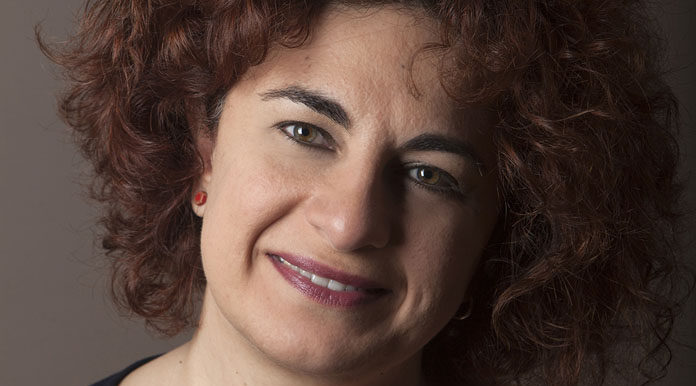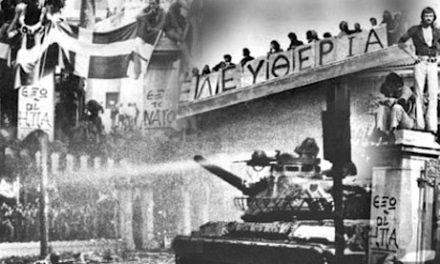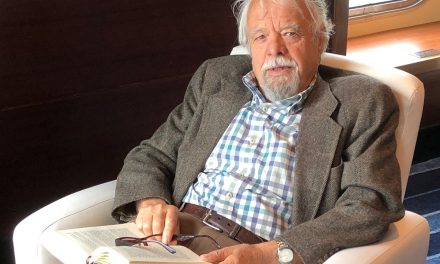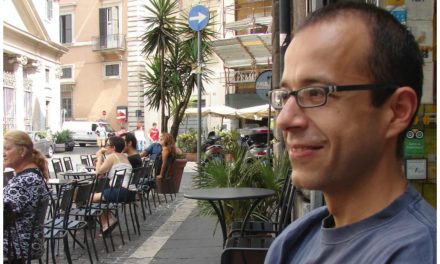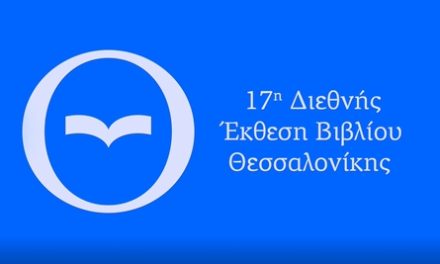Maria Koulouri works as a speech therapist, psychotherapist, and an animator at a theatre group of autistic and intellectually challenged adults (Μunicipal Theatre of Piraeus). She also works therapeutically through creative writing sessions with adults and children. She worked in poetry workshops at the Hellenic Open University (Master of Creative Writing). She is studying European Culture at the Hellenic Open University.
Bare Museum (Melani Books, 2013), her first poetry collection, won the First Appearing Poet – Hellenic Authors’ Society Award. She was also nominated for the National Poetry Prize. Clocks and other beats, her second poetry collection, published in 2015 (Melani Books), won the Athens Academy of Letters and Fine Arts-Lyric Poetry Award. Ordinary beds, her third poetry collection, was published in 2017 (Melani Books). Lits quotidiens, an anthology of her poems translated in French by Michel Volkovitch and Myrto Gondicas, was published in France in 2018 by Le miel des anges. Her one act plays have been presented in the form of a staged reading by the Hellenic Centre of International Theatre Institute. She is also the screenwriter of the short film “Possibly strangers”, directed by George Paterakis, and presented in domestic and international film festivals.
Maria Koulouri spoke to Reading Greece* about her latest poetry collection Ordinary Beds, which was written on the occasion of the massive influx of refugees in Europe, noting that the book actually refers to “the path of every person’s life […] the life journey and the seeking of a safe destination”. Asked about the main themes her poetry touches upon, she mentions “death, the mortal human nature and what this awareness implies, the acceptance of defeat, the impermanence of life, the position of women” as the thematic core of her poetry so far.
As for the relation of poetry to the world it inhabits, she comments that “poetry has never motivated people to protest in the streets” and that “this should not be the aim of poetry”, and adds that “political action arises from the readers of poetry”, that “shutting down television, disconnecting from the social media and opening a book is an act of resistance”. She concludes that “modern Greek literature has the potential to stand deservedly in the international literary field”. “However, state support will play a decisive role to this end. Of course, what is urgent is to support the Greek creators mainly within Greece, as well as to make an effort to expand readership”.
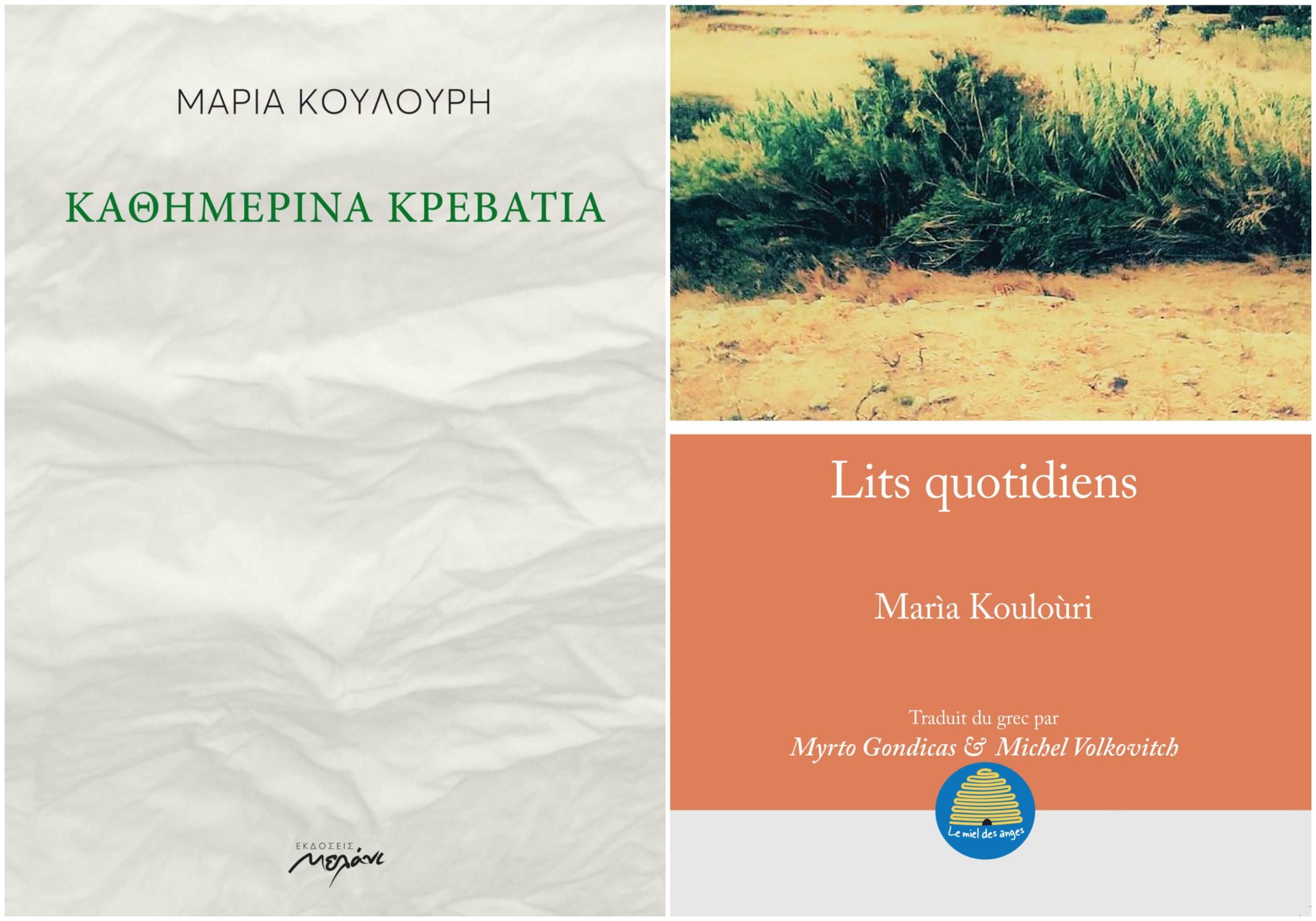
In contrast to your first two books, which focus on short poetic forms, your latest poetry collection Ordinary beds comprises five rather long poems. What is that differentiates your third book? Was the form dictated by the content?
In my third book of poems, Ordinary Beds, I had to deal with a specific subject. The poetic composition was not my initial idea. It came up through writing, and I thought I should keep on experimenting on this form. It was also a challenge since my first two books contain mostly short poems. The poetic composition allowed me to develop a continuum, a single strand narrative. Moreover, in Ordinary Beds, there is another form of experimentation: automatic writing. I focused on a particular subject, but I was writing without the control of logical thinking. Of course, at the final stage improvements and corrections were made, but they did not change the original idea. Thus, the theme and the writing process led me to compose five long poems.
Yet, I still believe in the power of short form. In poetry, a genre where the economy of expression is important, short form seems to be the ideal device for a poet. Besides the elements and the features of poetry, I think that short form corresponds to the fast-paced modern life. The fast-paced everyday life orders the direct, full of meaning and effective manner of expression. After all, it’s been a long time since Art had something new to say. Everything has already been said and today’s artist knows that he should start from this point.
How are the notions of anguish, wear and death imprinted on your poetry? What are the main themes your poetry touches upon?
Studying the themes that poets choose to write for, we can see there are no surprises. Death, love, the search for god, the meaning of life, are issues that concern poets over the centuries. So, through poetry, I myself am interested in writing about what is not easy to say, about those that are repressed and emerging in the empty space between the conscious and the unconscious. Death, the mortal human nature and what this awareness implies, the acceptance of defeat, the impermanence of life, the position of women I think is the thematic core of my poetry so far. I do not know if I could write erotic poetry. At least not to praise beauty. Although great poems have been written on this subject, I think I would approach love through loss, following the contradiction between love and death. Generally speaking, I do not care about the beauty that glorifies life in poetry, but as the opposite of ugliness, anguish, and decay. After all, it is so rare to see pure beauty.
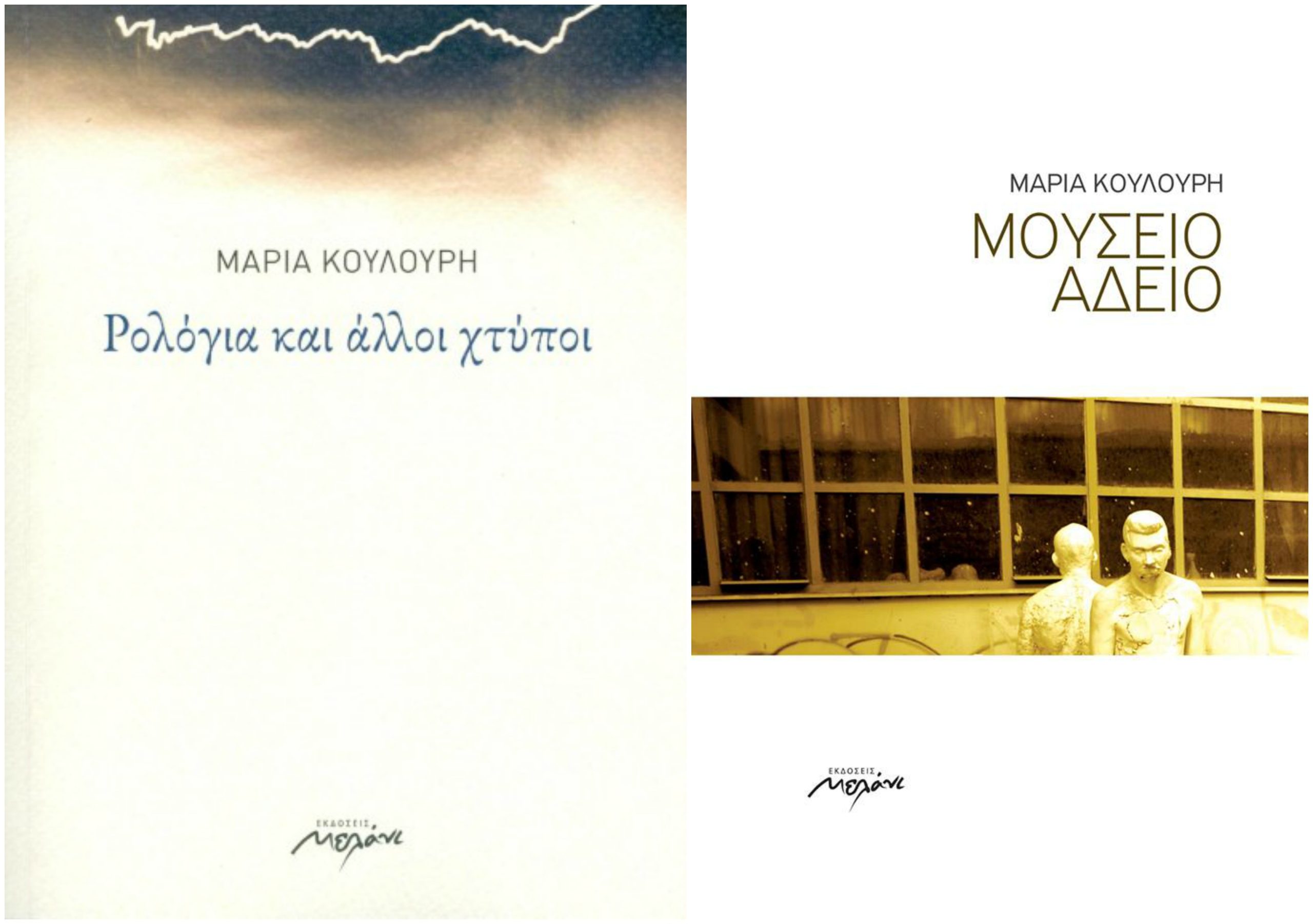
You have stated that Ordinary Beds was inspired by the image of unaccompanied refugee children sleeping in the forests of Europe. How does poetry interrelate with life in your work?
Due to the massive influx of refugees in Greece a few years ago, some artists have, probably, overused the subject of refugee. This was difficult for me. I mean, I did not like the idea of being in my warm home, with all comforts, using the human tragedy to satisfy my artistic anxieties. This, of course, requires a lot of discussion, and I know there is a reply, which says that creators wrote about the refugees’ issue to highlight the problem. It may be so, but I felt that by writing directly on this subject, I would just take away my responsibilities as a citizen.
At the period of the massive refugee influx, I read an article on the internet, which spoke about unaccompanied children traveling alone. Until they arrive in the country they had chosen, they were sleeping on the soil in European forests. The article and the accompanying photos shook me, and I felt the need to write. But, because of the reasons I mentioned above, I did not write about the refugees but on this occasion. I borrowed the title of the article, and I used it as the first verse of my composition. I applied automatic writing, having in my mind all the information and images related to this tragedy. Thus, I fundamentally talked about the path of every person’s life. I wrote about the life journey and the seeking of a safe destination.
In other words, I tried to move from the specific to the general. This is the only way I can see everyday life connecting with poetry. I am interested in the universality of the experience, how my experience or of someone else could become the experience of the whole.
What is the role a poet is called to play nowadays? Is it in the capacity of poetry to be ‘politically militant’?
Given that in poetry the transition from personal to universal is necessary, we would say that poetry plays by definition a role in politics. I do not think that poetry has ever motivated people to protest in the streets, and I do not believe it may happen. In fact, this should not be the aim of poetry. I do not know whether we can define a certain purpose for poetry or a single role for the poets. In the 1960s and 1970s, modern Greek poems were set to music by famous Greek composers, and in this way, poetry exerted a great influence over the public. However, it was not poetry that drove people to revolt against the Dictatorship.
Nowadays, political action arises from the readers of poetry. Someone who opens a book of poetry ruptures the decline that characterizes social values as they have been gradually shaped since the onset of the economic crisis. Shutting down television, disconnecting from social media and opening a book is an act of resistance.
I see no need to give any further purpose in poetry. It existed before us, and it will continue to exist. It is an Art with a long journey through centuries, and it is directly connected with language. As the ability to speak remains alive, poetry will be written and be read by some. Everything else seems more like tools for selfish purposes.
Vassilis Lambropoulos has commented that “the Greek poets of the 2000s, the Generation of the Left Melancholy, have a strong civic awareness and are very interested in the public presentation of their work. To them, poetry making does not end with writing verses but extends to the domain of their circulation broadly understood”. How is this trend to be explained? Could poetry offer new ways to imagine what can be radically different realities?
It is true that young poets are particularly interested in turning their work into literary material for further creation. We often see poems accompanied by representation, either a video or a performance. This activity keeps pace with the dominant role of the image in our time. The generation of young poets is familiar with technology and the opportunities it offers, as they often use it to publish their work. Very impressive results have appeared from the association of language and image helping to widen the initial venture and its reception from several points of view.
If we think the notion of representation in the course of History, we will see that it began to concern creators during the Baroque era. That is when man came to the center of the theories about the world. Since then, capitalism has not only established the omnipotence of man, but it has transformed man and his works into expendable material. In the post-capitalist era in which we live, what dominates is the acceptance of the loss of individual and social freedom, as well as the acceptance of defeat and compromise. Professor Vassilis Lambropoulos defines the concept of “left melancholy” considering that the frustration coming from the old regime creates the need for collective action on the part of younger poets, the need to focus on cooperation and alliance. And, of course, this co-action should only be positively commented. The only doubt is that there is a risk of altering the uniqueness of each creator, as well as the risk of his entrapment in a prevailing collectivity.
Karen Van Dyck, editor of Austerity Measures, has characterized the new generation of Greek poets as “multicultural, multiethnic and multigenerational”. How would you comment on current literary, and more specifically poetic, production in Greece?
I believe that poetic production in modern Greece is remarkable. The generation of young poets respects the legacy of ancient Greek literature, they often discourse with it, while they also have a powerful connection with major Greek poets about whom they were taught at school (Palamas, Cavafy, Elytis, Seferis, Ritsos, etc.). Young poets, having the advantage of distance, are emancipated from the awe of the grandeur of the past, so they write poems in a modern and lively language. I am particularly pleased with the fact that a lot of new generation poets explore the limits of language and the poetic form. I find it interesting that they choose to experiment, and when the experiment corresponds to the feeling, it bears effective outcomes. At the same time, I am fully aware of the impressive results that come from the osmosis between younger and older living creators, obvious in the work of both.
Something additional that should be noted is the many female poetic voices. I have the feeling that women who decide to publish their work are more today than in the past. Although I do not believe in the separation between female and male literature, the strong female presence in contemporary Greek poetry broadens the boundaries of creation.
I would say that modern Greek literature has the potential to stand deservedly in the international literary field. In recent years, some attempts have been made to publish modern Greek literary works abroad. However, state support will play a decisive role to this end. Of course, what is urgent is to support the Greek creators mainly within Greece, as well as to make an effort to expand readership.
*Interview by Athina Rossoglou
*INTRO IMAGE: @Vasia Anagnostopoulou
TAGS: LITERATURE & BOOKS | READING GREECE

